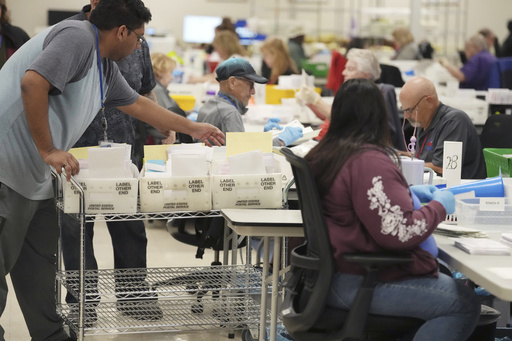In a significant turn of events, states that previously experienced intense scrutiny and challenges regarding election certification have now certified the results of the recent elections without any major disputes. This week’s actions led to Arizona’s Secretary of State declaring that “election denialism” has largely been consigned to history.
Despite this positive outlook, some officials remained cautious about the future of election integrity discussions. The smoother certification process observed this year is likely, in part, due to Donald Trump’s victory in the presidential race, which calmed the concerns of his ardent supporters who had previously raised ungrounded allegations of cheating affecting his results.
On Tuesday, both Nevada and New Mexico certified their election outcomes with little debate, while Arizona did so on Monday. Notably, these states had been embroiled in contentious certification debates during the 2022 midterm elections when Democrats secured many statewide positions.
The tumultuous background stems from efforts by Trump and his associates to interfere with certification processes in pivotal states like Michigan and Georgia during the 2020 election, fundamentally altering a typically administrative procedure. Interestingly, this year, influential voices who once questioned election integrity now celebrated Trump’s success.
David Levine, a former election official in Idaho, reflected that acceptance of the results may hinge on those previously undermining trust in electoral processes now feeling optimistic due to favorable outcomes. He expressed hope for a future where Americans might regain confidence in election results, regardless of personal preferences.
In Arizona’s certification discussion, Secretary of State Adrian Fontes noted the lack of controversy surrounding this year’s process, declaring, “I think the age of election denialism, for all intents and purposes, is dead.” On the other hand, Arizona’s Attorney General Kris Mayes expressed doubt about this notion, citing the ongoing challenges raised by her Republican rival from the previous election cycle. “Do I think election denialism is dead? No, I don’t,” she stated, emphasizing that the coming election cycles would reveal more about the overall sentiment.
Following Trump’s unfounded claims of fraud in the 2020 election, public confidence in electoral processes has notably declined, especially among Republicans. The certification phase has come under scrutiny, as some within the Republican ranks began openly challenging the process. This skepticism has been notably evident in Georgia, where attempts to politicize certification proceedings were later legally blocked.
Although overt challenges to the certification process did not arise following the Nov. 5 elections, a faction within the Republican Party continues to harbor deep-seated doubts concerning electoral protocols, including the use of mail-in ballots and automated counting systems.
During a recent forum on the social platform X organized by the group Cause of America, director Shawn Smith voiced skepticism regarding voting machines. He contended that the current certification process stifles legitimate inquiries and undermines “the sovereignty of the people.”
Despite a decrease in outright allegations compared to previous years, hints of skepticism emerged during local certification meetings this month, particularly in Washoe County, Nevada, where a narrow vote resulted in authorization of the election results, notwithstanding dissenting opinions from certain commissioners.
Additionally, skepticism is not limited to the Republican side. Following Kamala Harris’s losses in seven battleground states, some of her supporters have remained vocal about their disbelief, utilizing online platforms to express doubts and call for recounts.
As seen in Michigan during the previous election cycle, pressure tactics were used to halt certification of Biden’s win amid faulty fraud claims. Despite initial opposition, responsible parties eventually voted to confirm the election results this year without any significant contention.
In Georgia, Secretary of State Brad Raffensperger certified the recent election results without the immense pressure he faced in the past. North Carolina’s Board of Elections also voted unanimously to certify, without any fraud claims being raised, marking a stark contrast to the previous tumultuous election cycles.
Overall, while this year’s certifications signal a potential return to normalcy, underlying tensions regarding election integrity and confidence remind us that work still lies ahead to build enduring faith in the electoral process.


